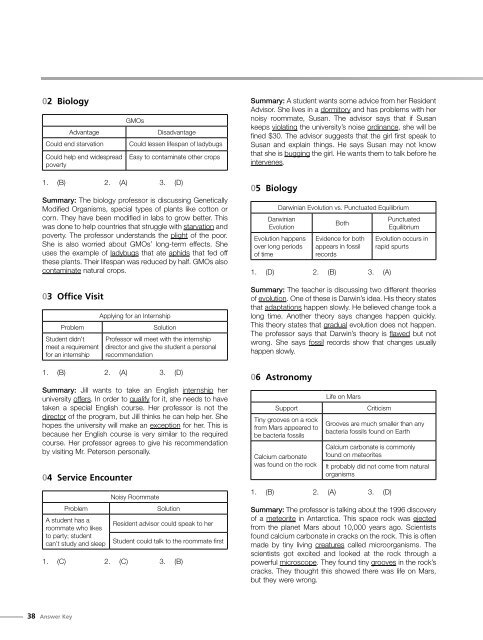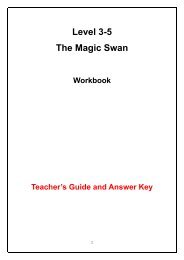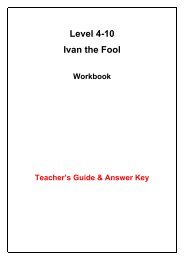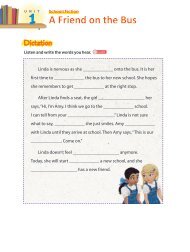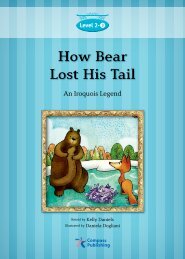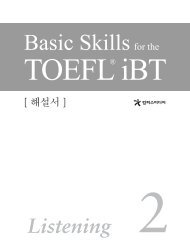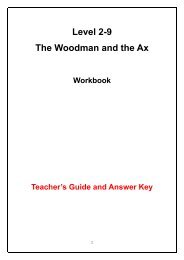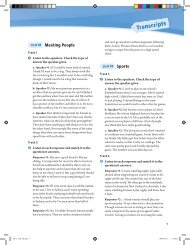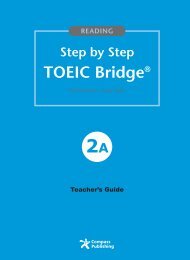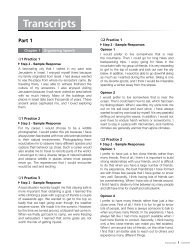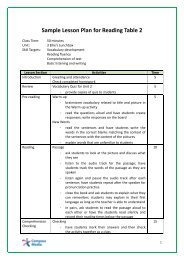Building Skills for the TOEFL iBT 2nd - Listening
Building Skills for the TOEFL iBT 2nd - Listening
Building Skills for the TOEFL iBT 2nd - Listening
- No tags were found...
You also want an ePaper? Increase the reach of your titles
YUMPU automatically turns print PDFs into web optimized ePapers that Google loves.
02 BiologyAdvantageCould end starvationCould help end widespreadpovertyGMOsDisadvantageCould lessen lifespan of ladybugsEasy to contaminate o<strong>the</strong>r cropsSummary: A student wants some advice from her ResidentAdvisor. She lives in a dormitory and has problems with hernoisy roommate, Susan. The advisor says that if Susankeeps violating <strong>the</strong> university’s noise ordinance, she will befined $30. The advisor suggests that <strong>the</strong> girl first speak toSusan and explain things. He says Susan may not knowthat she is bugging <strong>the</strong> girl. He wants <strong>the</strong>m to talk be<strong>for</strong>e heintervenes.1. (B) 2. (A) 3. (D)Summary: The biology professor is discussing GeneticallyModified Organisms, special types of plants like cotton orcorn. They have been modified in labs to grow better. Thiswas done to help countries that struggle with starvation andpoverty. The professor understands <strong>the</strong> plight of <strong>the</strong> poor.She is also worried about GMOs’ long-term effects. Sheuses <strong>the</strong> example of ladybugs that ate aphids that fed off<strong>the</strong>se plants. Their lifespan was reduced by half. GMOs alsocontaminate natural crops.03 Office VisitProblemStudent didn’tmeet a requirement<strong>for</strong> an internshipApplying <strong>for</strong> an InternshipSolutionProfessor will meet with <strong>the</strong> internshipdirector and give <strong>the</strong> student a personalrecommendation1. (B) 2. (A) 3. (D)Summary: Jill wants to take an English internship heruniversity offers. In order to qualify <strong>for</strong> it, she needs to havetaken a special English course. Her professor is not <strong>the</strong>director of <strong>the</strong> program, but Jill thinks he can help her. Shehopes <strong>the</strong> university will make an exception <strong>for</strong> her. This isbecause her English course is very similar to <strong>the</strong> requiredcourse. Her professor agrees to give his recommendationby visiting Mr. Peterson personally.04 Service EncounterProblemA student has aroommate who likesto party; studentcan’t study and sleepNoisy RoommateSolutionResident advisor could speak to herStudent could talk to <strong>the</strong> roommate first1. (C) 2. (C) 3. (B)05 BiologyDarwinian Evolution vs. Punctuated EquilibriumDarwinianEvolutionEvolution happensover long periodsof timeBothEvidence <strong>for</strong> bothappears in fossilrecords1. (D) 2. (B) 3. (A)PunctuatedEquilibriumEvolution occurs inrapid spurtsSummary: The teacher is discussing two different <strong>the</strong>oriesof evolution. One of <strong>the</strong>se is Darwin’s idea. His <strong>the</strong>ory statesthat adaptations happen slowly. He believed change took along time. Ano<strong>the</strong>r <strong>the</strong>ory says changes happen quickly.This <strong>the</strong>ory states that gradual evolution does not happen.The professor says that Darwin’s <strong>the</strong>ory is flawed but notwrong. She says fossil records show that changes usuallyhappen slowly.06 AstronomySupportTiny grooves on a rockfrom Mars appeared tobe bacteria fossilsCalcium carbonatewas found on <strong>the</strong> rockLife on MarsCriticismGrooves are much smaller than anybacteria fossils found on EarthCalcium carbonate is commonlyfound on meteoritesIt probably did not come from naturalorganisms1. (B) 2. (A) 3. (D)Summary: The professor is talking about <strong>the</strong> 1996 discoveryof a meteorite in Antarctica. This space rock was ejectedfrom <strong>the</strong> planet Mars about 10,000 years ago. Scientistsfound calcium carbonate in cracks on <strong>the</strong> rock. This is oftenmade by tiny living creatures called microorganisms. Thescientists got excited and looked at <strong>the</strong> rock through apowerful microscope. They found tiny grooves in <strong>the</strong> rock’scracks. They thought this showed <strong>the</strong>re was life on Mars,but <strong>the</strong>y were wrong.38 Answer Key


